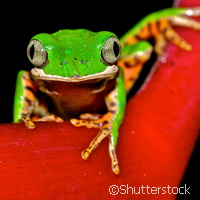Europeans aim to provide better access to biodiversity data
The Nordic states have entered into an agreement to drive and establish a Nordic E-Science for Biodiversity and Ecosystem Research infrastructure. Called LifeWatch, this European initiative emerged under the framework of the European Strategy Forum on Research Infrastructures (ESFRI). LifeWatch seeks to provide improved access to biodiversity data in favour of environmental research. The majority of biodiversity data are held by research institutions, environmental management institutions and non-governmental organisations (NGOs). By giving the public better access, scientific biodiversity and ecosystem research will get the boost it needs. A hot-button issue is the sustainable management of Earth's biodiversity and ecosystem services. LifeWatch will effectively improve our understanding of ecosystem functions and enable us to make predictions and simulations, including environmental interactions and species distribution, in a world that never ceases to change. The work being carried out by the LifeWatch team will benefit local and global policymakers. 'The Nordic countries have a great potential to create a joint highway for biodiversity informatics, enabling cutting-edge research and models for a sustainable use of our natural resources,' said Professor Ulf Gärdenfors, manager of the Swedish team of LifeWatch, from the Swedish Species Information Centre of the Swedish University of Agricultural Sciences (SLU). Sweden was the first of four Nordic states to begin building the national research infrastructure for biodiversity with the LifeWatch initiative. SLU is working with a number of universities and institutions in the country. Denmark, Finland and Norway are quickly following suit. The members of the Nordic LifeWatch team officially started working together in early November. Ultimately, the team will identify the scientific potential of a common Nordic infrastructure based on inventories of user needs, current data repositories and limitations related to data sharing in general. The findings generated by their work will lead to the development of strategies and a proposal for funding a Nordic LifeWatch construction phase in cooperation with diverse groups, including research councils, scientific communities and government ministries. Under ESFRI, LifeWatch will tackle key issues in: species observations and citizen science; sensors; species traits; biodiversity organisations; ecosystem services and auxiliary data (Earth observation). Experts are currently working on getting a joint European LifeWatch consortium off the ground, with Spanish, Italian and Dutch researchers keen to participate.For more information, please visit:LifeWatch:http://www.lifewatch.eu/web/guest/homeSwedish University of Agricultural Sciences (SLU):http://www.slu.se/en/
Countries
Denmark, Finland, Norway, Sweden



